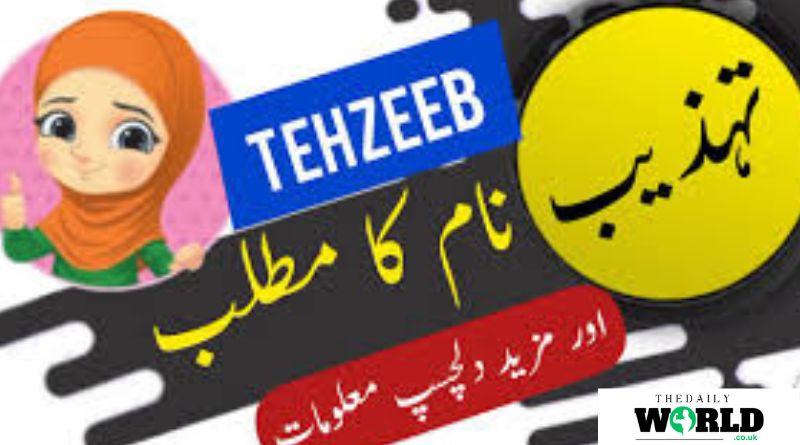Urdu, a language of profound depth, encapsulates more than just words—it carries with it centuries of culture, history, and values. One of the most significant and often discussed terms in Urdu culture is “Tehzeeb,” a word brimming with layers of meaning. It represents not just manners or etiquette, but the very essence of civilization and refinement in human behavior. This article explores the “Tehzeeb meaning in Urdu Recifest,” offering insights into how this concept has shaped the identity of South Asian cultures, particularly through the lens of Urdu.
Understanding Tehzeeb in the Urdu Context
Tehzeeb, as a concept in Urdu, is not merely restricted to good manners or social etiquette. It encompasses a wide array of values that define a refined individual in a civilized society. The word originates from the Arabic root “h-z-b,” meaning to refine, polish, or culture. Over time, the meaning has expanded in Urdu to cover various facets of culture, civilization, and moral upbringing.
In South Asian societies, particularly in Pakistan and India, the term Tehzeeb reflects a higher standard of living that integrates moral, ethical, and cultural refinement. It goes beyond superficial politeness to touch upon deeper human values such as respect for elders, empathy, generosity, and the pursuit of knowledge. These qualities are considered the hallmark of a person who embodies Tehzeeb. This understanding of Tehzeeb adds a distinctive layer to the cultural and social fabric of Urdu-speaking communities.
Recifest and Tehzeeb: A Cultural Phenomenon`
The term “Recifest” plays an interesting role in this discussion. Though not a traditional term associated with Urdu culture, Recifest is often used in modern contexts to describe festivals or events that focus on the revival of cultural values and heritage. When combined with the term Tehzeeb, it takes on a deeper meaning, representing the celebration and reinforcement of cultural identity through an organized festival or a platform where Urdu’s rich traditions are showcased.
Tehzeeb meaning in Urdu Recifest, therefore, can be interpreted as a collective celebration or event that seeks to highlight the core values of Urdu culture. Such events often feature literary festivals, poetry recitations, art exhibitions, and discussions on heritage. They serve to remind younger generations of the importance of preserving their roots, ensuring that the true essence of Tehzeeb is passed on through time. This blend of Tehzeeb with modern recifest events bridges the gap between tradition and contemporary society.
The Historical Evolution of Tehzeeb
Tehzeeb has deep historical roots that stretch back to the Mughal era, a time when the Urdu language was evolving, and its associated culture was flourishing. The Mughals were not only patrons of art and architecture but also of language and literature. During this period, Tehzeeb became synonymous with a refined courtly lifestyle, encompassing everything from how one spoke to how one dressed and interacted with others.
As Mughal influence spread across the subcontinent, Tehzeeb also permeated the wider society, influencing the way people conducted themselves. The respect for hierarchy, the importance of education, and the emphasis on hospitality were all integral parts of this cultural identity. Over centuries, this form of Tehzeeb became deeply embedded in the social consciousness of the people.
However, Tehzeeb was not limited to the nobility. As Urdu became a language of the masses, these values were adopted by people from all walks of life. Tehzeeb evolved to represent a broader moral and ethical framework that guided individuals in their daily interactions, creating a more humane and respectful society.
Tehzeeb in Modern Society
In today’s fast-paced world, some might argue that the traditional concept of Tehzeeb is slowly fading. The pressures of globalization and modern lifestyles have caused a shift in priorities, and with that shift, there is a noticeable decline in the everyday practice of these refined behaviors. However, it is also true that in many circles, especially within educated and culturally aware groups, the importance of maintaining Tehzeeb is still emphasized. It is seen as a counterbalance to the impersonal nature of modern society.
Tehzeeb meaning in Urdu Recifest highlights the modern efforts to revive and sustain these values through cultural gatherings and festivals. Events such as mushairas (poetry recitations), ghazal nights, and literary conferences serve as reminders of the richness of Urdu culture and the values associated with it. Through these recifest events, there is a conscious effort to keep the spirit of Tehzeeb alive, adapting it to contemporary times without losing its essence.
Tehzeeb in Literature and Art
Urdu literature and poetry are filled with references to Tehzeeb. Poets such as Mirza Ghalib and Allama Iqbal have eloquently explored the themes of cultural refinement, human dignity, and ethical living, which are all core aspects of Tehzeeb. For instance, Ghalib’s ghazals often touch upon the subtleties of human emotions and social conduct, while Iqbal’s poetry emphasizes the philosophical and ethical dimensions of human existence. Both poets, in their unique ways, reinforce the importance of Tehzeeb as a guiding principle for life.
Moreover, Urdu art and architecture also reflect the principles of Tehzeeb. The symmetry and attention to detail seen in Mughal architecture, such as the Taj Mahal and the Badshahi Mosque, are physical manifestations of this cultural ethos. The meticulous craftsmanship, the harmonious proportions, and the emphasis on balance all mirror the values of refinement and order that Tehzeeb embodies.
The Role of Family and Education in Preserving Tehzeeb
Family plays a critical role in imparting Tehzeeb to the next generation. In many Urdu-speaking households, children are taught from a young age to respect their elders, to be courteous, and to carry themselves with dignity. These lessons are often reinforced through religious teachings and cultural traditions. Education, both formal and informal, also contributes to the preservation of Tehzeeb. Schools that emphasize moral education, alongside academic excellence, help in cultivating a well-rounded individual who not only excels in intellectual pursuits but also embodies the values of Tehzeeb.
Furthermore, recifest events focused on promoting cultural heritage act as educational platforms where people of all ages can learn about the historical and social importance of Tehzeeb. By bringing together artists, poets, scholars, and performers, these festivals provide a rich learning environment that fosters a deeper appreciation of Urdu culture and values.
The Future of Tehzeeb
While the concept of Tehzeeb has undoubtedly faced challenges in the modern world, there is hope for its preservation and resurgence. The growing interest in cultural heritage, as seen through recifest events and the rise of digital platforms dedicated to promoting Urdu literature and art, suggests that Tehzeeb still holds relevance in contemporary society.
Moreover, as global awareness of cultural diversity increases, there is a renewed recognition of the value of preserving traditions that promote respect, dignity, and ethical living. Tehzeeb, with its focus on these values, has the potential to offer a much-needed antidote to the often impersonal and hurried nature of modern life.
Conclusion: Tehzeeb Meaning in Urdu Recifest—A Timeless Legacy
Tehzeeb, in its essence, represents more than just cultural refinement; it is a way of life that values respect, ethics, and a deep sense of responsibility towards others.tehzeeb meaning in urdu recifest tehzeeb meaning in urdu recifest
art, or everyday interactions, Tehzeeb continues to shape the identity of Urdu-speaking communities, serving as a bridge between the past and the present, and offering a guide for navigating the complexities of modern life.
Read also: check













